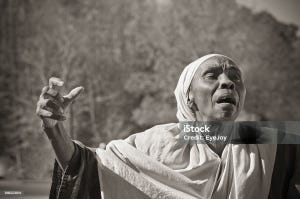Birthing God Within Struggle: Making Room for Mary the Bondswoman

In Luke’s account of incendiary incarnation disrupts imperial calm with news of a rebel’s advent. A young minority woman thus treks under threat of danger to deliver world-altering promises while managing social stigma of her sudden conception. Presented as the fiancé of working-class Joseph, seminal theological scholar Delores Williams complicates assumptions by explaining "Mary is a bondswoman under the system of patriarchy" when her pregnancy places survival at risk (Williams, 1993).
This is the image of a disadvantaged young woman navigating threats to herself and her child. Those challenges are echoed today in the ongoing public health crisis of disproportionate maternal mortality plaguing communities of color. Scholars highlight how vulnerability, lack of resources, and stress, endemic under White supremacist capitalist patriarchy, create conditions where Black women in America are three times more likely to perish in childbirth than their White counterparts (Taylor, 2019).
While piety imagines Mary serenely greeting angelic pronouncements, understanding her predicament as bonds-woman challenges us to connect sacred story and present suffering. The principle of Jesus born under the weight of oppression and exclusion asks: What room do our institutions provide for Black women endangered under intersecting, unjust systems needing advocacy and assistance? How do we move from avoiding inconvenience to actively welcoming, with dignity, those society disregards?
No Vacancy: Mary’s Plight as Bondswoman
Mary’s pregnancy excludes her from patriarchal protections as “damaged goods” notes pastoral care scholar Jennifer Koosed (2022). Social displacement, as an unmarried, expectant mother, carries presumed disgrace. Further, Rev. Dr. Eboni Marshall Turman highlights Mary’s triple vulnerability as a youthful female of lower class, at the mercy of an Imperial edict. Such a setting evokes images of modern day asylum seekers (2018). Imagine walking barren deserts, great with child, as an alien refugee seeking security. Luke’s terse description conceals what must have been her visceral anguish.
Estranged While Embedded
Ecclesial circles frequently exalt mother Mary's humble obedience. Yet, how many women through history have shared her silence, suffering abuse by religious figures whose elevation of feminine perfection serves to conceal exploitation? If God’s enfleshed arrival within the human timeline enters through the scandal of teen pregnancy, every story of coerced intimacy exposing corruption deserves sanctuary.
Process theology invites us to see the divine dwelling within human stories rather than removed to distance. Emmanuel, God with us, is found by walking in solidarity with bondswomen struggling under the strain of deified abuses of power (Suchocki, 2018).
Where is the Holy Family outcast today? Perhaps with a Lakota mother resisting pipeline trespass atop her people's burial grounds. Or, in the pain of an incarcerated girl critiquing economic exclusion. Jesus is birthed, not in an idyllic Colorado Christmas card scene, but where neglected women survive together.
Black Mothers Made Vulnerable
While exact details differ, the stresses faced by this first-century teen bondswoman finds an excruciating echo in Black women made vulnerable across American history, from slave ships to present postpartum beds. Systemic denial of medical resources, assumptions by those meant to provide care, and refusal to acknowledge pain, push women of color to a breaking point with threats that our darkest days are still ahead of us.
And yet White-dominated pro-life movements further constrain agency for those coerced by economic inequality into physical torment. As womanist ethics scholar Melanie L. Harris cogently states, Jesus is invoked to protect hypothetical life at cost of tormenting actual living girls and women. These women and girls endure a harrowing exposure to unjust systems which force them to beg the State for their very lives – and even the lives of their future children (2017).
The Divine Task of Making Room

But if Christ chooses to tabernacle in wounded places among people accustomed to making do on society's scraps, Elizabeth Conde-Frazier asks “what would it mean to worship a God who dwells within the struggle, not removed from it?” (2022).
The season of Emmanuel beckons those of us in sheltered spaces to expand care, uprooting excuses, upholding unequal suffering. Ecclesial inertia mirrors the crowded lodgings in Luke 2. Beyond charity, communities affirming life must dismantle barriers so all might thrive, prioritizing and centering those who inhabit the margins.
Divinity Solidary in the Birthing Struggle
So in birthing spiritual insight and renewed systems, sacred purpose is found in an excruciating glory which breaks through fatal human constraints that strangle potential. The divine work is not remote from human blood, sweat and tears but embedded within courageous love, laboring to birth new life out of death's dark shadow (Johnson, 2020).
This sacred incarnation of the Word, bound up in the bondswoman’s flesh, sanctifies each hand that refuses to let systems leave behind our vulnerable. The Light still shines from ravaged corners where women band together, though institutions abandon them, isolated in policy brutality. God is within that holy collaboration birthing alternative possibilities.
The cries of women enduring hardship in pregnancy and childbirth echo through the centuries. May their labor stir up advocacy, birthing better structures, so God again takes on flesh in outcast places of external stable walls, or hospital hallways.
The divine work of justice happens through and for them first of all. This Advent, sanctuary is a place not simply housed safely, but welcomed to lead completely. No longer can prophets of moral outrage guard respectable gates barring messy humanity. Divinity Solidarity beckons us to join where lonely roads converge into justice.
Bibliography
Conde-Frazier, Elizabeth. Listen to the Blood: The Medicinal Theology of Elizabeth Conde-Frazier. Cascade Books, 2022.
Harris, Melanie L. Ecowomanism: African American Women and Earth-Honoring Faiths. Orbis Books, 2017.
Johnson, Elizabeth. Abounding in Kindness: Writing for the People of God. Orbis Books, 2015.
Koosed, Jennifer L. The Marys: How the Mother of Jesus and Four Other Holy Women Taught Me to Be a Feminist. Fortress Press, 2022.
Suchocki, Marjorie Hewitt. In God's Presence: Theological Reflections on Prayer. Chalice Press, 2018.
Taylor, Sonya Renee. Body and Soul: The Black Women’s Guide to Physical Health and Emotional Well-Being. The Feminist Press at CUNY, 2019.
Williams, Delores S. Sisters in the Wilderness: The Challenge of Womanist God-Talk. Orbis Books, 1993.
Suggested Reading:
Cannon, Katie Geneva. Black Womanist Ethics. Wipf & Stock, 2006.
Grant, Jacquelyn. “Black Theology and the Black Woman.” Black Theology: A Documentary History, 1966–1979, Orbis Books, 1993.
Marshall Turman, Eboni. In Defiance of Exclusion: The Marys in Early Christian Tradition, Augsburg Fortress Publishers, 2018.
Townes, Emilie M. Womanist Ethics and the Cultural Production of Evil. Palgrave Macmillan, 2006.






